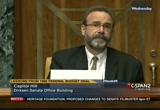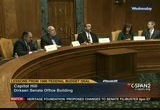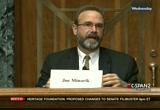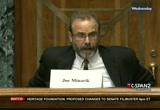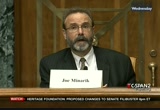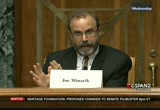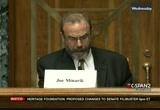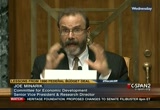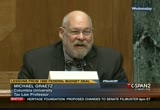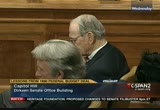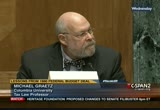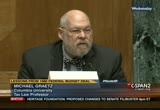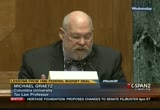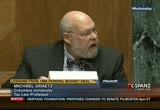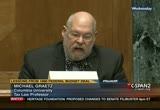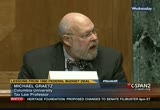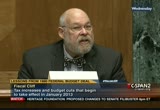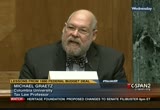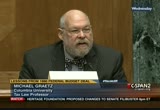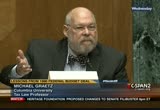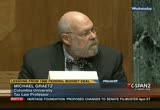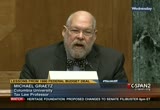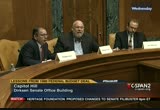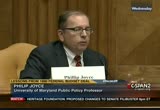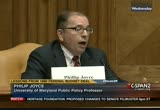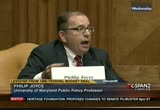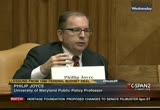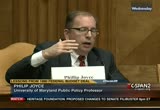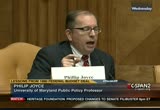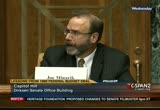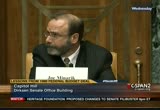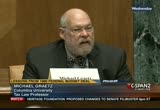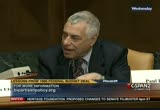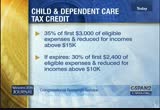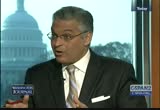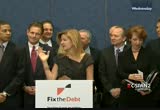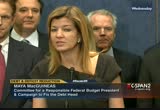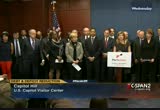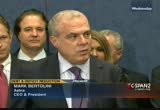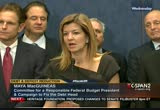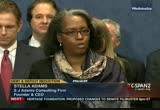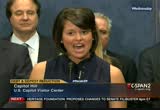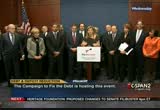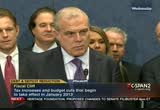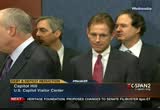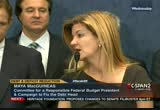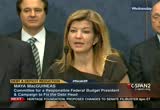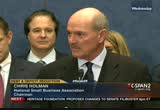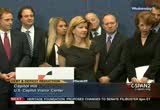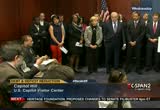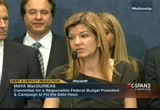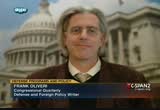tv Public Affairs CSPAN November 30, 2012 7:00pm-8:00pm EST
7:00 pm
when i talked to my students, i try to explain to them, you want to keep in mind that a treasury bill now selling for one quarter or 1% annual yield to take us back to the recent historical average in good times before% annual yield, is going to increase the cost of servicing the treasury bill by 16. the treasury debt on average in any given time, about one third matures within one year. about one third matures between one year in five years. only a third of the it's more than five years out. when things get nervous or even if interest rates rise back to their historical lap race, the images i keep thinking of is the cost of servicing the public debt, taking the pole vault over the anxiety barrier of the financial markets. when interest rates rise the
7:01 pm
7:04 pm
process alone is not the solution to the problem. you do need policy agreement to make the thing work. however, i think it is important to understand that the policy process can be an important agreement in keeping things on track as we move further. i agree with dave obey if you can't solve the problem, to which you can do. we used to say that back in the 1980s and he was director of cbo. there is one other thing we have to take into context. the budget problem we have now is so large that we make it to the point where we have to deal with fundamental changes in policy rather than simple incremental changes. it may not be possible to shave a little bit off of medicare reimbursement. we have to think very seriously about changing the way the process works.
7:05 pm
on the other side, noting that they did a moment ago, medicare, fundamental reform is essential. on the other side, let's pretend revenue increases because for increasing growth. we need real increases in revenues measured on a static basis and i think got to recognize that. if a possible if we can't do the whole job it is a scorecard of zeros. we still could have pay-as-you-go debit on a scorecard or restart, which would tell us in years further down the road we have to do to revenues or entitlements to save money that may be awake coupled with inadequate sequester to make the process work going
7:06 pm
7:07 pm
7:08 pm
congressional staff lower numbers. but it was not right if that's what happened. there are a few things i'd like to echo from this morning session. one is that no one should think that george h. w. bush did not know the risks that he took. he knew exactly what risky took and he did it for several reasons. and he should be appreciated for that. it did put us on a path to getting our deficit in order. people have talked about the need for leadership. i think that the surprise of newt gingrich and his departure in the circumstance, where the administration had passed the majority of his party and the majority of the democrats get together and do this, everyone knows about this.
7:09 pm
it was clearly putting a personal agenda ahead of a governmental one at that point. my lesson is to be alert and keep your eyes open. third, i would say something you were expecting is not happening. what happened to us was the effect on the budget -- it was that the energy crisis spike. we have spent a lot of time working on energy taxes or the alternative of energy taxes. ..
7:10 pm
>> debt is higher now than since world war, and 90% of the debt was owned to the americans, and the reason that the pressures don't seem as real as they are, and here, i want to be clear that the pressures are not next year and the year after. the pressures are between now and 2020 or even later is that
7:11 pm
europe has been in such a bad shape. that is, when you tie your monetary souls together and ignore your fiscal side, and when they get out, there's huge risks, but i would urge people in washington would not underestimate the price paid by the debt ceiling debacle of last year. it was not that we downgraded our debt and then our interest rates didn't change. that's a misreading. what happened is that the financial markets are spooked by the uncertainty in washington and by the belief to win anything no matter how stupid, and let us be clear, not raising the debt ceiling on the table
7:12 pm
again is as stupid a policy as anyone can imagine. the whole debt ceiling doesn't make sense, and the idea you will not raise it when you need to is really playing some form of roulette that's not appropriate. there's a number of changes sense the act that i want to emphasize. in addition to the fact the financial risks are less obvious and pressing on the american public as was mentioned in the last session, the economy is international in the way it was not in 1990. that is, we can talk in 1990 about raising corporate taxes and lowering the tax on dividends, for example, which was one of the policies suggested during the 1990s discussions that came in effect
7:13 pm
in 2003. that's just completely backwards today. that is to say corporations are facing international competition and downward pressures on taxes at the business level that are not faced by individuals op their receipts, and we would be better off today if we had a lower tax at the corporate level and much higher tax at the individual level rather than what we have now which is the opposite of that which brings me to another major lesson is do not let policy become hostage to deficit numbers. that is, you have to think hard about what policies will allow the united states to achieve growth needed of fair distribution of the tax burdens and spending programs that the
7:14 pm
united states is engaged in. adequate revenues to match the spending that we're going to have. there are differences in policies that are better and worse, and i just want to give you one example which i think is an important example. i do not think in 1990 the obsession that our side, republican side had tax rates, nominal tax rates, work to our advantage, i think we ended up with a 31% rate for a brief moment, and then we had a 39.6% rate. noferred -- in order to avoid a rate higher than 31%, we enacted the personal exemption phase out and what was known as tease, an itemized deduction ceiling, and we expanded minimum index and
7:15 pm
inflation, and all the policies are disaster. each one is a disaster, and the new disaster would be the layer on the back, the cap on itemized deductions which is what everybody seems to be talking about. now most sides agree on it because it doesn't look like a rate increase. well, two or three points about that. one is if my state and local taxes are 6% and i deduct them and tax rate is a third, they cost me 4%. if i don't deduct them, they cost me 6%. i say, my marginal rate is up 2 #%. i think every's going to figure this out before long. if you think that going up 2% on the marginal rate is going to destroy america or hurt the economy in some major way, so will this. so will this. at the same time, if i cap
7:16 pm
itemized deductions completely, what i've done is allow myself to limit the deduction on preexisting loans in a way that if congress was to address mortgage rates, it would not begin to do, grandfather existing loans and phase in whatever changes that it makes dedictions over time. in an economy that's as dependent as the one we're now in is on housing, going forward. that is, if you look at where are the bright spots in the american economy? it is the return of the housing market, and the return of the construction industry and housing. the idea that we're going to put in a cap that's going to affect housing prices at this moment, which i assure you the kinds of caps we're talking about will because people will know that if they got state taxes of this much, they are not going to get deductions for home marge interest is extremely risky in
7:17 pm
my opinion, even though nobody's talking about it. the third thing i'll say about the policy is that if you put in a cap, you better not do it on charitable deductions because if you're a republican, and you really believe, and to take george bush's phrase, let a thousand lights, the non-profit sector, the create evident, you are going to severely inhibit charitable deductions with policies elastic in terms of price, and price goes up if there's an overall cap, and that's going to be the first thing to go because the state and local taxes can't go unless i'm rich, i can't pay off my home mortgage interest, but if i am, of course, i can, and so forth. we need to separate out business taxation from non-business taxation because the individual
7:18 pm
income tax is being held hostage to the flow-through entities taxed at the individual level which include huge, huge, huge, three times huge, private enterprises because it used to be that in order to amass great amounts of capital, you have to go to the public market. if you go to the public market, you have to tax the corporation. you can now amass large accumlations of capital through private equity and sovereign wealth funds and other avenues, and you have some very large businesses that are not being taxed as corporations. on the other hand, you have some small businesses with employer -- with real employees, not talking about myself. i'm a small business. i'm really small. i'm the only employee. i'm not talking about independent contractor who drive federal express trucks around the city. real small businesses should be
7:19 pm
given relief and given incentives to hire people and what happens is that increasing the tax rate on passive investors is held hostage by the fear we'll cost jobs in the small business economy. there are important ways to think about policy, and this will be my final point. i don't want to go on beyond my share, but one of the things that was true at andrews on both the congressional side and on the administration side was that the staff work had been done. the cbo was prepared. the joint committee on taxation had met with our office at the treasury, and we had options that you have still not heard of that, for raising revenues. we have thought of all sorts of ways to do things, and we could limit, itemize deductions in at least 17 different ways, and we have revenue estimates on them because we knew somebody's going
7:20 pm
to want to know just like that. i am not convinced that the staff work we began, certainly by the early part of the 1990s and late 89 before i got there, has been done at the same level. we had five varieties of energy taxes, we could have told you not just about the revenue, but how they affected regions, products, all sorts of things, and so i think the staff work is crucial, and i'm hoping that the joint committee on taxation and cbo on the house and congressional side and the treasury and omb on the administration side are doing this work, but that's one huge, huge lesson. i think -- i could go on, needless to say, but i think i'll stop. one last thing i do want to say, and that is, don't -- the president's priorities matter.
7:21 pm
george herbert walker bush's priority was to lower the capital gains rate, and that meant that the administration did a lot of things in order to not raise the capital gains rate, try to get it lowered and so forth that created huge difficulties for us. the current president's priorities is to move the 35% rate to 39.6% on some high income people, whether it's a million dollars or $500,000, i don't think he cares, but he cares about getting that rate back up, and that's going to tie the discussions in knots if people are unwilling to cut him some slack on that. >> thank you very much, and i want to say that i used to spend a lot of time in this room as well when i worked at cbo, but
7:22 pm
if bob is happy to be up here, i used to sit behind him and wait for him to turn around and ask me a question which he never did because he knew everything. i want to associate myself with three points that have been made, and just make a quick couple additional appointments. the first is i want to agree with every single word that has been said about george hw bush's leadership in 1990. i mean, i actually think that this is, you know, sort of the unsung story of our effort to get deficits under control, but i guess i want to broaden that to say that i think presidential leadership is absolutely important. i do not think congress as an institution is very well positioned to lead an effort involved inflicting pain on people. i think they need to go with
7:23 pm
someone, and whether it's two parties in congress or the president, that's important. it helps to be a second term president and not a first term president. i think they have more than what president bush could exercise that leadership, and i hope that he does so. i don't think he did that in the first term, and it may be he was not a second term president if he had, but i'd like to see that happen. the second point i would associate myself with is a point that joe had made which is that the budget process does not make elected officials do things which is not in their political interest to do, and i don't know how many times we have to learn the lesson or relearn it, but that's the lesson, and i think it's theless --
7:24 pm
the lesson of the supercommittee. somebody could say, well, ultimately, if we come to a deal now, it was because of the supercommittee. we came to an agreement on the debt deal, and we created the supercommittee, and that failed, and sequestering, and in order to avoid it, we timely reached a deal. well, i don't think the people voting on the debt deal actually thought, well, this is going to be a five-step process of failures until we get to the solution. i think if we reach an agreement now, it will be because it is in their political interest now to reach an agreement, not necessarily because the process made them do it. i used to hear people say bring back the gaps in pay-go, and i think that learns the wrong lesson from 1990. the gaps were a symptom of an agreement on a path to reduce
7:25 pm
the deficit. they did not cause the deficit to be reduced, and, in fact, what we learned from that, the bea experience was that the budget process is not very good at forcing people to do things they do not want to do, but is good in enforcing actions as long as that agreement holds, and the caps in pay-go became less good as enforcing that agreement once they had surpluses, for example. the third thing that i would like to say is that partisanship is messy, but so is bipartisanship so the fact that things don't look right now like, you know, we may kind of easily reach agreement does not necessarily mean that we won't. it is kind of always darkest before the dawn. now, do i know exactly how that's going to happen? no, but i don't think you can look at what people are saying when we're still pretty far from the brink, whatever the brink is, and kind of predict from
7:26 pm
that exactly what's going to happen. you know, in any political system, if you want to reach agreement on contentious policies that inflict pain on people, it's a messy process in getting there. this leads me to two quick points not brought up much on the earlier panel or this pam. the first is that i think a legacy of the 1990 agreement is an attention to the distributional effects of the policy. there's not a lot of attention to the policies before 1990, but you see a lot of attention to it since then. when i was researching the book, there was a story about the first agreement that came up where the it didn't show what they might want it to show, and instead, speaker was very upset
7:27 pm
about the fact, and the distributional effects saying we are slaves to the tables, but since then, there are really two questions that get asked about almost every policy. the first is, well, how much is it going to cost or save, and the second is who will it effect? what's the effect on different income groups? the last thing i say is if we are going to reach agreement this time, we are going to have to agree on the numbers, and what the numbers mean, and i think there is an argument which we have not quite yet fully confronted about baseline. in this particular it ration, i didn't hear anybody in the earlier panel say before we got to the agreement on the percentage of spending cuts against tax increases, we have to agree on what the baseline was. right now, if you hear somebody talk about a $2 trillion package or a $4 trillion package, they
7:28 pm
don't necessarily agree on what $2 trillion is from or what is $4 trillion from? i don't know how many of you have reflected back on the 1995-1996 government shut down, but i spent a lot of time thinking about it, and what a lot of people don't realize is that a big reason that we ended up with that government shut down is because of the disagreement between the parties over whose numbers to use, whether omb's numbers or cbo's numbers. we have to agree on the basic numbers, and the basic baseline that we're working from before we ultimately reach any kind of agreement, and i'll stop. >> good. thank you, phil. we're almost out of time. one or two more comments, anyone on the panel? >> phil made a very good point, and it reminds me of an analogous situation, perhaps in 1983 with social security fix.
7:29 pm
when walking out of the room, the people who agreed from one side of the aisle to the other also agreed to allow each other to characterize the agreement in the way of their choosing. for example, the agreement to tax social security benefits became a tax on the democratic side and benefit cuts on the republican side, leaving open the possibility that give people -- if people decide there's an era of good feeling and an agreement on a deal, democrats could use a baseline that makes taxed increase numbers look larger, and republicans could take the same policy using the baseline to make tax increase numbers look smaller, and everybody could be happy so it's a risk. it's also an opportunity. ..
7:30 pm
7:31 pm
and the decisions got a lot easier not only because of gorbachev and the defense budget is talked about in the earlier panel, but also because growth was so exceptionally robust and surprisingly robust. and surprisingly robust. on the downside this time rather than the upside, on the downside this time rather than the upside, which is going to require hard political choices in an environment as is emphasized in the first panel, were making those choices is much more difficult for our political representatives. >> michael, those are very good with it and not. we are faced with hard choices, a political environment overcome a by leadership is harder today than it was a four. i want to thank you all for coming. we will be doing more of these
7:32 pm
7:33 pm
families and businesses adjoining the sort that discussion is stephen sloan, to start with, could you define frat a tax credit is and how that differs from a taxom deduction? >> guest: post-credits and deductions are used to lower somebody's tax bill. they credit lower somebody's tax bill dollar for dollar. if you say you have the $1000 tax credit come your tax lowere, -- basically a reduces taxable income, so it takes the taxable income off the top. if you have a $1,000 tax deduction, that is basically a to under $50 deduction -- $250 deduction. host: on their tax credits that specifically affect families?
7:34 pm
guest: some that have expired that are part of the fiscal cliff package. they get much less attention than the bush tax cuts. they are part of the packet of decisions that congress has to make. host: we can go into debt but to highlight four --th let's start with the child tax credit. what is it? guest: this is a credit that applies to families, some that you can use if you make up to ,000.0 it is they $1,000 credit for each child. unless congress acts, that 10000
7:35 pm
becomedit will $500, but becomes less valuable. you can make up to $130,000. host: that is the child tax credits. guest: almost 24 million families claimed it in 2009. it is one of the bigger tax credits out there. host: the next one would be the child and dependent care tax credit. guest: is a credit between 20% and a 30% and goes up to $3,000. it helps families with their expenses for child care or if they have dependents and things like that.
7:36 pm
you can basically claim a credit of $3,000. host: for child care purposes? guest: this helps with dependents. host: the earned income tax credit is what? guest: it is a credit whose primary recipients are working parents with children. this is something that is designed to help the low-income families help them have lower tax bills and get money back from the government at the end of the year. host: the phaseout begins at $5,000. to elaborate on what that means? guest: it is something that is aimed at the lower income people scale.
7:37 pm
that is what we're looking at. host: the final one deals with education. guest: this can about during the stimulus. this is a tax credit for education expenses. it expires at the end of the year unless congress extends it. host: when do these impacts take place if nothing is done in december? guest: most of these end at the end of 2012. this would affect people in january. host: what is the benefit for the treasury department? guest: the treasury would get more money. that is money that is no longer coming into the treasury. it is real money. the child tax credit claims in
7:38 pm
2009 totaled about $20 million. you can get a sense of how much on the treasury would have gone if that credit were not in place. host: is there a sense of what this has cost the treasury? guest: several hundred billion dollars. host: is a large part or is this a side issue as other things get debated? guest: most of the discussion is what happens to the top two tax rates. that's where most of the political attention is right now. these are important issues for families. they haven't quite gotten the attention yet. host: lower income, middle
7:39 pm
income, that is where we're talking. guest: this is the heart of tax policy for low and middle-income families. this is if you're making tax policy at those families. host: steven >> the executives are members of the group called the campaign to fix the bad. this is 20 minutes. >> okay, thank you. welcome, everybody. it has been a remarkable day for the fix the debt campaign and i
7:40 pm
want to thank everybody who's joining us here today and all the participants of today's event. we are joined and i'm really privileged to be part of this in a remarkable group of people coming across the country. return by small business leaders, heads of nonprofits, students, ceos come a huge diverse group of people who came to capitol hill today because they want to spread the message the country cares about are not for the fiscal cliff and putting in place a comprehensive debt deal to do with their country's fiscal challenges. the message they brought the suit alleged that go off the cliff. we don't want shoot to death the country. i should affix the country. but a productive meetings in the past companies at the white house can the leadership of the senate and the house and senate members have come back, i believe we been able to deliver the message of how there's so many people with different
7:41 pm
backgrounds, different political points of view, different life experiences you really believe this is a critical moment for the country. what they're asking to do is come together and take on challenges, work together and put in place the pan for the good of the country. it's not about special interests. it's about the public interest in the message me out to diverse group of folks we have here would be great at delivering and giving how many people wanted to meet with them loud and clear. so what are what are they to do is ask a couple of different people there today to come and speak for a minute or two about by their ability to campaign to fix the debt. and i am just so thrilled with what has happened the past couple of, where what was in a kiddie talk about an issue come in the and fiscal responsibility doesn't always get that much attention is truly attracted people across the country.
7:42 pm
with 300,000 citizens and send it to be a part of this. we have different groups, different state organizations commingling press of people coming together to work on this issue. again, this is not about social interests. it's not about partisan interests. per se but to make to the podium mark bertolini. >> thank you. good afternoon. i would first put forth the reason we are serious this nation is one grand bargain away from needing the world out of this recession and dominating the world's economy for the next 50 years. so we have very comprehensive and frank conversations today with leaders of congress. the kidneys if everybody understands the urgency about what needs to be done and how quickly it needs to be done. secondly they have agreed a deal with the issues are. there aren't a whole lot and
7:43 pm
they're pretty much around what do we do about revenue and what do we do about entitlement reforms? the bad news, we are running out of time. in my latest calculation, we are 802 hours away from having a big problem i will send the economy into recession and put people out of work and we don't want to see that happen. so we encourage congress and the white house to put aside political rhetoric is still in this conversation and writes about it to make sure we have revenue necessary in order to get this economy forward and entitlement reform that helps make sure the nation is a safe and wonderful place to live. so with that, alternate back over to my. >> that is one of the thing certified about today, which is stability we could get in this country by knowing what's around the corner instead of facing a
7:44 pm
cliff, facing certainty by putting in place a bet deal would really be one of the key ingredients to unleash potential allowing small business leaders can they businesses to invest more in importantly create jobs again become one of the keys in getting the back on track. i would like to ask stella adams to come up to the podium. she's a civil right and it's also a small business owner. >> thank you, my aunt. my work has been to protect the most vulnerable and i've joined fix the debt because one of the core principles is that we don't go up the fiscal cliff and they don't make sacrifices that crushed the most vulnerable populations. and so, i stand here to speak for those groups. we recognize the importance of
7:45 pm
doing true reform, true building revenue, true reform and reducing debt where we can, but not at the expense of the state did not for all of us. and all our interests have to be the same. all of us need to contribute to reducing debt to and removing us from this class. it is not an option for an action. if we have not, the people who are least likely to survive it are the ones who will be hit the hardest and hit first. i want to leave you with a bible verse because that's what they do. and it's philippines chapter two verse four. each of you should look not only to your own interests, but also
7:46 pm
to the interests of others. >> thank you very much. next i'd like to invite up trend to come and media specialist at colorado state university. >> hi, i am kiersten a senior political science major at colorado state university. he would think is a graduating senior at the number one thing i would care about would be getting a job. and i guess in a way that's what a lot of people are thinking about. but i actually want to be a local government practitioner. and so i'm thinking about the debt in a totally different way. i think if we allow things to go as they are or make a decision that isn't the right decision, will find yourself unable to provide service is to local areas that we have promised, that we need and i hope to one
7:47 pm
day be a paradise. in in addition to that, fix that has amazing core principle is that regardless of where you come from, you can find a way to rally around. so reducing spending, tax reform and entitlement reform are all thinks he can come to the table and talk about. i am here urging that uses do that. thanks. >> thank you very much. finally we'll hear from wanda rohm, founder and owner presto prints and in san antonio. she's a long-standing advocate for small and women owned businesses. >> i think being a small business advocate has become my new life striven thing to do. as a small-business owner, i understand the challenges every day and the love i felt for my employees. they were my family, my friends.
7:48 pm
on a ticket and insurance and tiny pieces of equipment. i wanted to do all these things, but if a business owner you know which are restraints are in which you can afford to do and which you can't afford to do. this is what our government needs to learn is what it can afford to do but cannot afford to do. great empires have fallen through the roman empire, british empire and we are not tolerable to this. the scariest thing to me is this is all coming from the side. it's not problems coming from the outside of the united states. so it's things we can control and change within our country because it's coming from within. >> thank you so much louder speakers. i would point out we have so many people appear today. each of them at a different story in different for being here. where former governors, civic leaders, religious leaders. it truly is an impressive,
7:49 pm
diverse crowd. the message i think which will come across over and over again, which is its time to fix the country and while everybody here would have a different first choice if they were going to get into details but i put together a comprehensive plan to fix the debt, i think what we are all trying to save his time to come together and put in place a plan. the time is running out. it's critically important to make these choices. we know failing to do so has tremendous inaction -- tremendous consequences for the country and there's a lot of upside from put in place a sensible plan on their own terms while we still have time. so i am incredibly gratified to have all these impressive people who have taken time out of their busy schedules to come to washington to deliver this message. there's a couple questions about the campaign, we can take that. >> at this juncture, based on your meeting today, is your impression a bigger pattern it to deal with republicans
7:50 pm
entrenched on income tax rates or the democratic unwillingness? >> i don't think this is a party problem. i think it's a political problem right now. the details of this need to be worked out with people having a higher order to do what they're doing this. it should be about who wins or loses. it shouldn't be with you let truths that the election. what it should be as highly put americans back to work? how to prevent our economy from going to recession again in leading this country forward. i think that dialogue needs to happen and we are in the midst of some of those conversations today. i think the details are being discussed. this obviously different points of view, but it's time to raise about the political rhetoric of the campaign. [inaudible] >> we don't advocate any specific position on a policy level.
7:51 pm
[inaudible] [inaudible] >> from the meeting today with boehner and the republican leadership -- [inaudible] >> i like the tenor of that meeting and maturity permitted to have a very positive. again, you see a lot of people have clearly recognized how important this issue is who want to do something certainly not going off of the cliff and a policy issues to work out, which of these discussions are still going on. or clearly not privy to the details, but i think the tenor is very positive and our message was really well received, which as we can come here representing so many different interests in asking you all to work together. we know these are things to do with the tight timeline and he
7:52 pm
makes all the important we get it done quickly embraced. again, i received a message -- the meetings we had today were quite positive. [inaudible] [inaudible] >> i am cookie driscoll from multiple suburb of gettysburg. i do a lot of etp work with emotional projects, so i have business owners come to me she get items embellished. logos, names, phone numbers. i am also seeing more and more of them pull back from that promotion because they don't know what their future is, which is directly impacting the future. it's a house of cards that is slowly coming down.
7:53 pm
[inaudible] is that helpful or harmful for the president -- [inaudible] should they be out campaigning or should they be behind closed doors? >> i think they should clearly be educated in terms of the type you need to set the stage for the kind of choices about them putting together the debt deal the president has the bully pulpit no one else has. at the same time the campaign is over. it is critically important that what we are in the midst of now can we stay in the midst of a pivoting to problem solving that means time for partisanship is going to have to be put aside. now it's a negotiation. but the president will go out there and use the bully pulpit to educate the country and bringing them. we continue to be divided and fight it out, run out of time
7:54 pm
and everybody will be hurt in the process. i say again it's absolutely inexcusable we contemplate bedding the countries understand we need to fix it. [inaudible] [inaudible] >> yeah, that is actually this is all about. i'm chris ullman, chair of the national small business assist haitian and that's really what this is all about. i think it's paramount everybody understands the president on down this is not a political issue. in this cookie said, a lot of people in business are holding cash. there are stories of capital to come forward as soon as they know. the investment in uncertainty.
7:55 pm
as soon as it is result, you will see the economy began to kick again. but we are all very active in contacting our representatives and senators. [inaudible] >> we tell them a couple things. one is to bipartisanship and and got this thing objectively because this will be an issue in their next campaign if that's where their heads around. more importantly in the economic welfare of this country politics has to go aside. [inaudible] unless the wealthiest americans are willing to stand up and say we need to acquire deeper income tax rates, republicans are going to cover to do politically. a lot of you fall in that category. is there anyone willing to step forward and say you support this or you advocated this during
7:56 pm
meetings? >> i'm going to comment because one of the things we don't want to do is help negotiate or that because they are in the midst of really some tough negotiations. what i heard about the meetings today is people coming forward saying they might be part of the solution were not going to tell them how you fix the problem. we are not advocating anyone plan or anyone policy. these are people looking to washington and this is it's really different. not saying giddiness and not saying don't touch this, but coming into office saying that message is so different and i hope that's what makes the impact different. >> there's a lot of talk about the solution of the finality. it comes to sort of rededicating over and over. what is it now that actually
7:57 pm
would have -- [inaudible] >> the bottom line is nothing focuses like a fiscal cliff. there's fiscal cliff clocks. we are counting the hours after negotiate. everybody knows about the fiscal cliff. your kids probably know about the fiscal cliff. this is a new moment, which is filled with guys, but that it is also an opportunity, which is if we can't do it now or this member of congress new changes have to be made in may for the ness partner with these changes need to be, but something forces them to do it, and this is the best move that we've had. let's hope we don't go through these political values for they fight it out and we are almost frustrated because they can't cover and the headline the next day after wachovia put together since the u.s. still faces a huge fiscal problem. what we really want to do is put in place a plan big enough to fix the problem and that's going
7:58 pm
to be what's going to have the upside of the certainty of stability around the corner and importantly finally showing to all of us that this country can govern itself. the whole world is watching right now i'm rooting for us. people want the united states to claim out and fix this problem and the clock is ticking as we wait to see if they'll be able to do it. thank you. [inaudible conversations] >> frank oliveri is the policy
7:59 pm
125 Views
IN COLLECTIONS
CSPAN2 Television Archive
Television Archive  Television Archive News Search Service
Television Archive News Search Service 
Uploaded by TV Archive on

 Live Music Archive
Live Music Archive Librivox Free Audio
Librivox Free Audio Metropolitan Museum
Metropolitan Museum Cleveland Museum of Art
Cleveland Museum of Art Internet Arcade
Internet Arcade Console Living Room
Console Living Room Books to Borrow
Books to Borrow Open Library
Open Library TV News
TV News Understanding 9/11
Understanding 9/11